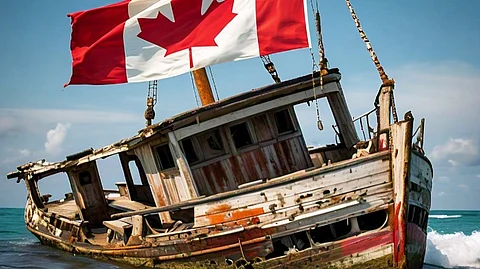

Dr. A.W. Barber is the former Director of Asian Studies at the University of Calgary. He is internationally active and has wide-ranging interests
Various news outlets have reported that Prime Minister Carney was thumping his chest, claiming that Canada is willing to lead if the US is not. This raises two questions.
First, lead based on what?
Second, lead in what?
Of the G7, Canada is ranked dead last in economic standing ― a ranking it has long held.
It was not always so. Using Canada's military strength as a metaphor, the Royal Canadian Navy was at the end of the Second World War ranked above the Australian, French and New Zealand navies, in fourth place among the seven allies. Presently, among the same peer group, Canada is ranked sixth.
Considering this, Canada is certainly not in a position to lead based on its economic or military strength ― a rather sad state of affairs if you think about it.
The context of Prime Minister Carney’s statement was about fighting President Trump’s tariffs. He wants to lead a coalition of the willing in such an endeavour.
But why should Canada lead in such an ill-conceived collation? Why not France or Germany?
Further, the leader of such a coalition will be shackling themselves to certain positions, while other members will have greater freedom to abandon the fight and come to terms with the White House. This fight is ill-conceived because of how the marketplace and leadership work.
For example, France does not come to terms with President Trump. Therefore, French wines face higher tariffs in the USA. France is the second largest exporter of wine to the USA. The tariffs decrease sales of French wine, which opens up the possibility of increased sales for other wines.
Spain, the fifth-largest exporter of wine to the USA, has on the other hand, made a deal with President Trump. It aggressively markets its wine in the US, gaining market share.
When the pressure from the French wine producers becomes sufficient, the French government comes to terms with President Trump. However, it now will take years for French winemakers to regain the market share it lost.
In the same manner, as each country loses income, market share, and more, they will make a deal that is best for themselves. However, to be the leader in a fight, you have to take the firmest stances to have the standing to rally the members to keep up the fight.
This often puts the leader as the last to come to terms with reality. Is this where voters want Canada to be?
It is highly doubtful that Japan, South Korea, or Taiwan will join such a coalition because of the security arrangements in the Western Pacific Rim.
Vietnam has offered to remove all tariffs on US goods. China joining this coalition of the willing would be complicated, considering the 100% tariff Canada places on Chinese electric cars and the recent difficulties between China and the EU.
The EU is already preparing to negotiate with the White House but is also preparing counter-tariffs if needed. It seems questionable that the UK would join because its goods have a noticeably lower tariff than EU products and it is already negotiating.
As of now, there are 50 countries lining up or having negotiated with the White House. It is too late now, but Canada should have been the first in line.
The prime minister's chest-thumping is actually for home consumption. He is desperate to convince Canadians that he is helping Canada by fighting Trump. Canada borders on the country with the largest economy in history ― a privileged advantage any other clear-thinking country’s leaders would envy.
Are we actually going to throw that away to be the leader of some ragtag coalition to fight tariffs? As reported by Jim Hoft (Gateway Pundit, Apr.3, 2025), the prime minister has already flip-flopped on his anti-USA rhetoric. Frequently, the guy thumping his chest and yelling about how tough he is is not tough. If Mark Carney is elected the prime minister, he will probably fold like a cheap suit on a trip to Florida within days of the election.
Mark Carney has declared that the old relationship between Canada and the US is over.
This is utter nonsense. The damage to the relationship is not a long-lasting fissure, but a temporary bump that allows the Liberal Party to have talking points because of President Trump’s heavy-handed approach. This too will pass.
Far more concerning are Prime Minister Carney’s possible conflict of interest from his company receiving a favourable loan from the Bank of China and his seeming desire to bring Canada into closer alignment with the EU.
Mario Draghi’s report on the EU’s competitiveness points to a failing enterprise with little time to recover. Prime Minister Carney’s designs for Canada have the potential to damage the country for decades.
